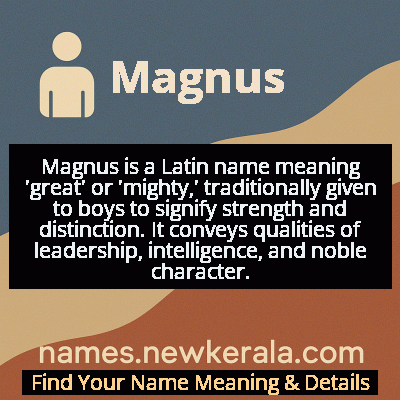Magnus Name Meaning & Details
Origin, Popularity, Numerology Analysis & Name Meaning of Magnus
Discover the origin, meaning, and cultural significance of the name MAGNUS. Delve into its historical roots and explore the lasting impact it has had on communities and traditions.
Name
Magnus
Gender
Male
Origin
Latin
Lucky Number
3
Meaning of the Name - Magnus
Magnus is a Latin name meaning 'great' or 'mighty,' traditionally given to boys to signify strength and distinction. It conveys qualities of leadership, intelligence, and noble character.
Magnus - Complete Numerology Analysis
Your Numerology Number
Based on Pythagorean Numerology System
Ruling Planet
Jupiter
Positive Nature
Optimistic, inspirational, and creative.
Negative Traits
Scattered, exaggerating.
Lucky Colours
Yellow, gold, purple.
Lucky Days
Thursday.
Lucky Stones
Yellow sapphire.
Harmony Numbers
1, 2, 9.
Best Suited Professions
Arts, writing, communication.
What People Like About You
Creativity, optimism.
Famous People Named Magnus
Magnus the Good
King
United Norway and Denmark under peaceful rule in the 11th century
Carl Magnus von Hell
Chemist
Developed important halogenation reactions in organic chemistry
Magnus Carlsen
Chess Grandmaster
Longest-reigning World Chess Champion and highest-rated player ever
Magnus Hirschfeld
Physician and Sexologist
Founded the first gay rights organization and pioneered gender studies
Name Variations & International Equivalents
Click on blue names to explore their detailed meanings. Gray names with will be available soon.
Cultural & Historical Significance
The name's Latin origin ('great') made it popular among educated classes during the Renaissance and Enlightenment periods, symbolizing intellectual and cultural aspirations. In modern times, the name maintains its prestige while becoming more accessible, representing a bridge between classical education and contemporary values. Its enduring popularity across centuries demonstrates how a name can evolve while retaining its core meaning of greatness and distinction.
Extended Personality Analysis
Individuals named Magnus are often perceived as confident, intelligent, and naturally authoritative. They tend to possess strong leadership qualities and a calm, commanding presence that inspires trust in others. Their name's meaning of 'great' often creates self-fulfilling expectations, driving them to achieve excellence in their chosen fields. Many Magnuses display strategic thinking patterns and analytical minds, making them effective problem-solvers who approach challenges with methodical precision.
Despite their strong presence, Magnuses typically balance their authority with integrity and fairness. They often demonstrate loyalty to their principles and those they care about, showing protective instincts toward family and friends. Their combination of intellectual curiosity and practical wisdom makes them respected advisors and mentors. While they can be reserved in emotional expression, their depth of character and reliability make them valued companions and leaders who earn respect through consistent action rather than empty promises.
Modern Usage & Popularity
In contemporary times, Magnus has experienced a resurgence in popularity, particularly in Scandinavian countries and among parents seeking strong, classical names with international appeal. The name ranks consistently in the top 100 names in Norway and Sweden, while gaining traction in English-speaking countries like the United Kingdom and United States. Modern parents are drawn to its powerful meaning, historical prestige, and distinctive sound that stands out without being overly exotic. The success of figures like chess champion Magnus Carlsen has contributed to its modern cachet, making it appealing to educated, globally-minded families who appreciate its blend of tradition and contemporary relevance.
Symbolic & Spiritual Meanings
Symbolically, Magnus represents greatness in its most aspirational form—not just physical strength or power, but intellectual, moral, and spiritual excellence. The name carries connotations of leadership that is earned through wisdom and character rather than inherited privilege. It symbolizes the potential for extraordinary achievement and the responsibility that comes with great ability. In metaphorical terms, Magnus represents the bridge between classical virtues and modern excellence, embodying the ideal of using one's talents for meaningful purposes. The name suggests a person who can see the bigger picture while attending to important details, making it symbolic of balanced power and thoughtful authority.

